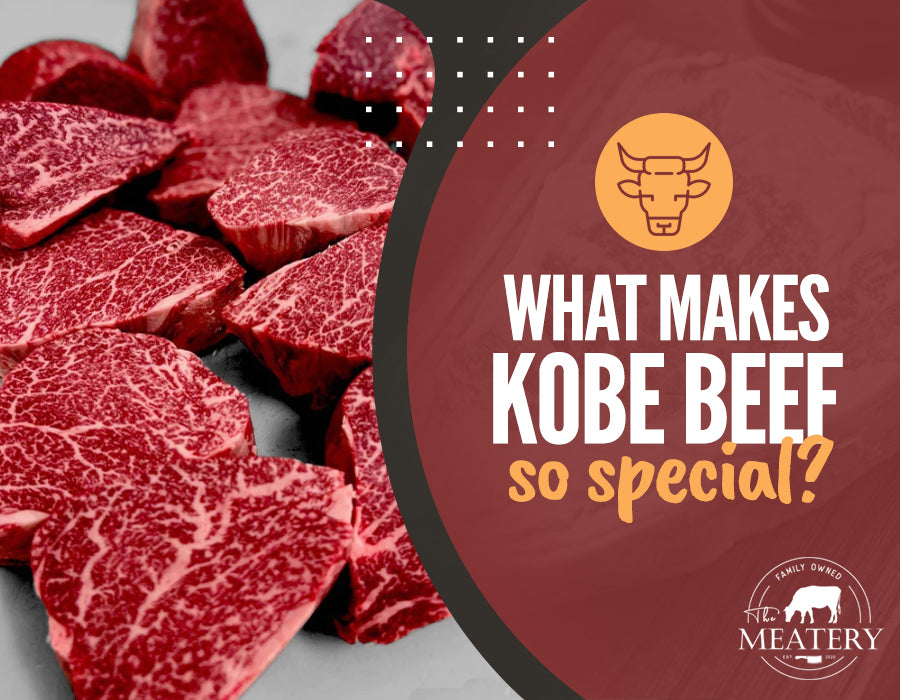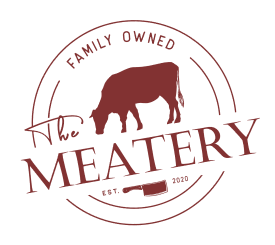As a steak lover, you might search for, 'What is the absolute best steak in the world?' If so, you will likely come across the famous and the world's most expensive beef – Kobe Beef.
But what makes it so special? How did Kobe Beef become such an unforgettable brand? We're here to answer those questions and more about the beef that is so remarkable in the eyes of chefs, food experts, and steak fans worldwide.
What Is Kobe Beef?
Before we quench your thirst about why Kobe beef is so special, let's talk about what exactly Kobe Beef is. Learn more about Wagyu cattle breeds on our blog.
Kobe beef is a prestigious type of Wagyu beef, hailing exclusively from the Hyōgo Prefecture in Japan, specifically the city of Kobe. To earn the coveted Kobe beef designation, the Wagyu cattle must undergo rigorous standards and inspections throughout their lives.
Only a select number of cattle meet the stringent requirements to be marketed as Kobe beef, with an estimated annual production of around 5,500 head. This limited availability contributes significantly to the high demand and premium price associated with Kobe beef.
What Makes Kobe Beef So Special?
Kobe beef is widely valued in Japan, and the country does a fantastic job publicizing its rarity. The black gold caviar of meat, Kobe Beef, is like a well-aged bottle of Chateau Margaux.
In other words, it's a pricey status symbol in high demand. The Kobe Beef industry has been around since the Edo period (1603–1867). It was during this time that the first cattle were imported from Europe. Today, Kobe Beef remains famous for its rich flavor, tenderness, and extreme exclusivity.
To qualify as Kobe Beef the steer must be a purebred Tajima-gyu. Interestingly, this bloodline of the Kuroge Washu became isolated from other breeds after being introduced in the 2nd century. There are many theories about how this isolation affected Kobe Beef's flavor, softness, and fat content, the most popular supporting that it improved the above.
Unlike other Wagyu beef, Kobe is renowned for its dense, evenly distributed marbling, which melts on the tongue, creating a truly indulgent experience.
If you're seeking premium cuts of beef that offer exceptional taste and quality, explore our selection of high-quality steaks. Our Australian Wagyu Ribeye and American Prime Filet Mignon provide a luxurious and flavorful dining experience, even though they may not reach the same level of marbling as Kobe. Each cut is carefully selected to ensure you enjoy a rich, satisfying meal.
Myths Surrounding Wagyu
Wagyu is Healthy
True! Wagyu has more monounsaturated fats and omega-3s than commercial beef, or "bad cholesterol." Here's a great article describing the health benefits of Highly Marbled Wagyu.
Wagyu Listen to Music
Legend says that Kobe Beef starts with cows that like classical music. While this is a palatable myth as the more relaxed a cow is, the better the beef it produces, it is simply untrue.
Interestingly enough, Japanese researchers did go out of their way to research if cows enjoy music. They found that cows didn't enjoy classical music when fed. Instead, they enjoyed relaxing music, which led to more milk production and an increased appetite.
Is Wagyu Massaged?
This is only partially true. Wagyu that are massaged are done so reactively, as a way to alleviate the cattle's muscles if they aren't able to roam as freely as they should. They are also massaged during the winter time to prevent cramping from cold Japanese weather.
Do Wagyu Really Drink Beer or Sake?
Yes, some Wagyu is fed beer to as an appetite booster during the summer months. It is not a default practice, however.
The Meatery carries Kobe Wine Beef (different than Kobe Beef) which is also from Kobe and is fed byproduct from the local Kobe Wineries.
What Are The Requirements For Authentic Kobe Beef?
There are specific requirements for Wagyu to become Kobe Beef.
Breed
Kobe Beef must be from a Tajima-gyu cow, a bloodline within the Kuroge Washu breed. In addition, it must be of pure Tajima-gyu lineage, a steer (castrated bull) or virgin cow.
Location & Feeding
The animal must have been raised in Hyogo prefecture and fed Hyogo Prefecture grain and grasses entirely.
Quality
Kobe beef must attain the highest A4 or A5 grades. Further, the Beef Marbling Score (BMS) must be 6 or above and the cattle must weigh at most 470kg.
Slaughter
The steer must be processed at a slaughterhouse in Kobe, Sanda, Kakogawa, Nishinomiya or Himeji (all in the Hyogo Prefecture).
Kobe Beef Marketing & Distribution Promotion Association
Both the producer and slaughterhouse must be dues-paying members of the Kobe Beef Marketing & Distribution Promotion Association.
You can ask to show paperwork from the restaurant. Kobe beef comes with an authorized 10-digit ID number and QR code. Through these, its origin may be traced back to the individual cow from which it was sourced.
A piece of Wagyu can only be referred to as Kobe Beef if all of these conditions are met.
Final Note
While Kobe Beef is certainly not an everyday experience, it is a great "Bucket List" item for foodies. For those that don't want to spend upwards of $100 per ounce and still want to experience Kobe Beef, The Meatery is authorized to sell it and does so at very competitive prices.
The Meatery is the nation's finest purveyor of ultra-premium meats. View all of our meats, including Japanese, Australian, and American Wagyu and take advantage of Meatery Live to have a knowledgeable staff member video chat with you to ensure you pick the perfect steak for your experience.









